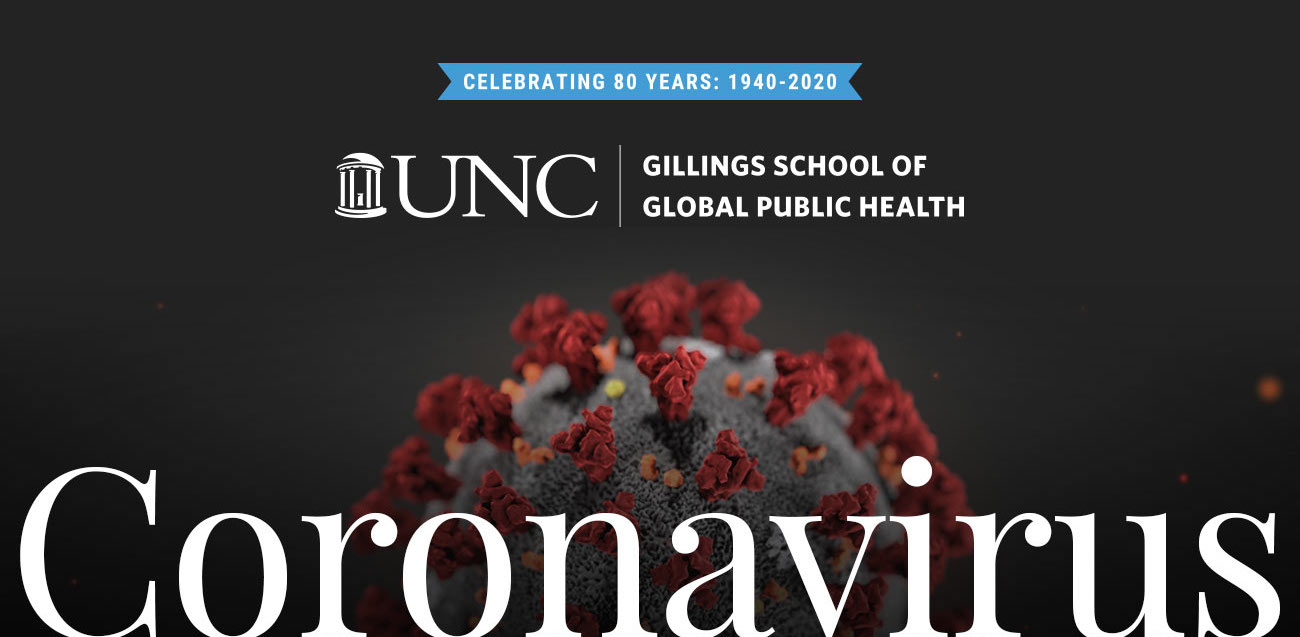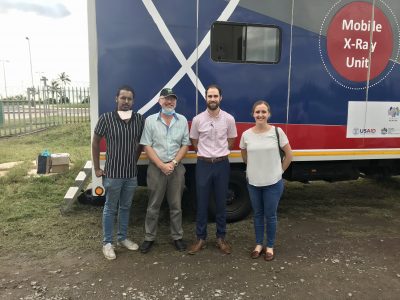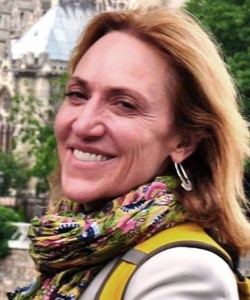The Gillings Community Responds to COVID-19: Global Outreach

June 1, 2020
The challenge that COVID-19 poses across the globe epitomizes the importance of public health education and research. At the UNC Gillings School of Global Public Health, students, alumni and faculty from across disciplines are working tirelessly to put learning into action in the face of a global health crisis.
COVID-19 lockdown brings outreach opportunity to vulnerable populations in South Africa
On March 27, South Africa entered a national lockdown in response to the COVID-19 pandemic. In Durban, the third-largest city in South Africa, more than 2,000 homeless individuals were placed into secure lockdown sites where they have received food, shelter and critical medical care, in part due to the collaboration between the City and the Advance Access & Delivery organization.
Advance Access & Delivery (AA&D), based out of Durham, North Carolina, was co-founded in 2015 by health behavior alumnus Michael Wilson (’14 MPH) to build local systems of health care delivery that meet the needs of vulnerable and socially marginalized groups. AA&D has been actively working in South Africa since 2016, and in 2018, Wilson moved to South Africa, where he currently serves on the Deputy Mayor’s Homeless Task Team and manages a 5-year project in Umlazi, KwaZulu-Natal to improve linkage to care for patients living with tuberculosis (TB) and non-communicable diseases (NCDs).
During the COVID-19 lockdown, AA&D has played a lead role in coordinating health services with the Durban Department of Health across 12 sites where individuals experiencing homelessness are staying during the lockdown. Hundreds have been re-initiated on treatment for TB and HIV. The fatality rates for cases of untreated TB are high, and because South Africa has one of the highest burdens of the disease worldwide, AA&D led an initiative alongside the MatCH institute to perform chest x-ray screenings across the homeless sites. So far, over 80 additional cases of TB have been found during the lockdown and initiated on treatment.

Michael Wilson and colleagues stand in front of a mobile x-ray unit in Durban, South Africa.
AA&D has also co-managed a drug withdrawal program with partners from Durban University of Technology. This program has provided daily, observed doses of methadone to 250 homeless individuals who have been experiencing moderate-to-severe symptoms of drug withdrawal during the course of the lockdown.
Through his work, Wilson says he has seen a remarkable shift in public opinion on the treatment of drug use disorders. He believes it has now become more apparent to the community, including city officials, that short-term opioid substitution therapy programs are a necessary part of a package of health services for those experiencing drug withdrawal.
In the big picture, Wilson has viewed the lockdown as an opportunity to deliver compassionate and comprehensive healthcare to a group of people that is very often overlooked.
“This is something we at AA&D have been advocating for – accelerating the delivery of health services to vulnerable groups, taking the burden off the patient to go into a facility or clinic and wait in long queues,” he said. “Instead we are extending the reach of hospitals and clinics into the places where people live and work – in this case, where they are spending lockdown. The lockdown has provided an up-close understanding of what it takes to keep people on their medications and the positive impact of daily accompaniment. This period of 8 weeks has allowed teams of dedicated health workers to walk alongside patients and support them day-in and day-out. The changes we have seen have been dramatic. This brings me much hope.”
Wilson has seen new alliances forged in public health as a result of the lockdown in Durban. Many sectors have merged, and the City has chosen to look at issues of access to care and coverage head-on, forming working groups that are committed to maintaining progress beyond lockdown. It will continue to be a long road ahead, but Wilson is hopeful that the foundation laid during this time will contribute to Durban becoming an even healthier city as a result.
Read more about Wilson’s work with drug withdrawal treatments for homeless populations.
Hoemeke advocates for the protection of essential health services in Africa

Dr. Laura Hoemeke
You may know Laura Hoemeke, a 2015 Doctor of Public Health alumna in health policy and management, from the classes she teaches for the MPH@UNC program. But she also manages a consulting firm, Hoemeke Global, Ltd., where she provides technical assistance to clients seeking guidance on health policy, management, program design and implementation strategies. Her partners include the Bill & Melinda Gates Foundation, Clear Outcomes, USAID and the G4 Alliance.
Hoemeke’s work with COVID-19 is focused on Africa, where she consults with global health organizations and ministries of health. Response to the novel coronavirus has put a financial strain on countries across the globe, and when health care systems are overwhelmed, many essential services – such as maternal, newborn, child health and family planning – are at risk for loss of funding. In addition, as the focus shifts to responding to an infectious disease outbreak, the public is understandably afraid of going to health facilities for routine care.
This can have a significant impact on mortality, not just from the novel coronavirus, but from otherwise preventable diseases.
“As we know from past outbreaks, especially the Ebola outbreak from 2014-16 in West Africa, much of the morbidity and mortality that occurs during an outbreak is due to the lack of other health services,” she explained. “Experts have predicted an additional 1-2 million child deaths and almost 60,000 maternal deaths within six months if people stop going to health facilities because they’re understandably afraid of getting infected.”
Part of her work has involved helping countries develop COVID-19 response strategies and budgetary plans that align with guidance from the World Health Organization (WHO) on how to maintain essential services.
According to Hoemeke, “It was important for countries to consider the needed protection for these services as they were developing and costing out their national COVID-19 action plans. Unfortunately, many national response plans in West Africa didn’t include the PPE and commodities needed to protect essential maternal, newborn and child health services.”
Hoemeke is hopeful about the innovative approaches to testing, contact tracing and public health education that many West African countries have developed in response to COVID-19 and looks forward to her continued work to help countries ensure that what she called the “indirect morbidity and mortality due to COVID-19” does not reach the dire projected worst-case scenarios.
“My colleagues in Africa are determined to emerge from this pandemic with stronger health systems,” she said.
See more general information about COVID-19 at the Gillings School’s Coronavirus Information Portal.
Read more about how Gillings students and alumni are responding to the COVID-19 pandemic in our previous feature.
Find a roundup of all our experts’ coronavirus-related media outreach in this Twitter moment.
Contact the UNC Gillings School of Global Public Health communications team at sphcomm@unc.edu.
